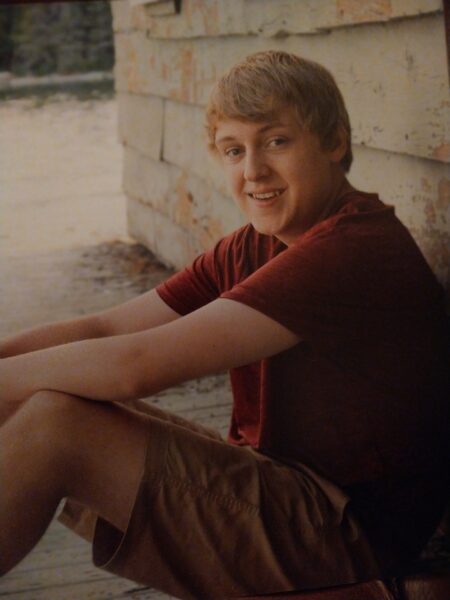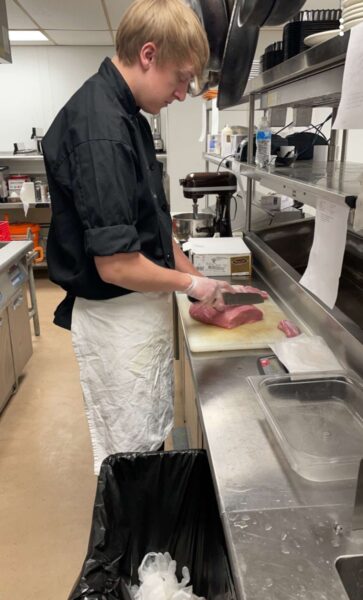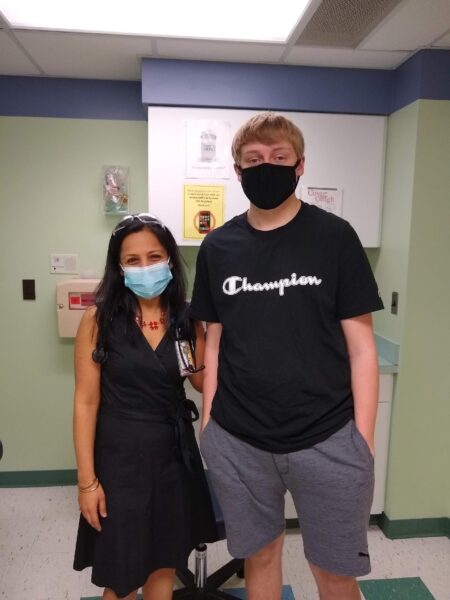
Evan Wooldredge, who graduates in May from high school, has always made the best of any restrictions after a rare disease affected his kidneys. He learned to love cooking because of his disease and intends to have a career in culinary arts and/or hospitality management.
Evan Wooldredge, age 18, is the kind of person who is always up for a challenge. Whether he’s creating a new menu item at work, learning to golf or managing a rare disease that affected his kidneys, Evan doesn’t let restrictions hold him back.
One of Evan’s biggest challenges happened when he turned 10. After a week of fighting off a sinus infection, he was rushed to Akron Children’s emergency department with a severe stomachache. By the time Evan arrived, he was in kidney failure, critically ill and needed to start dialysis. He met Shefali Mahesh, MD, pediatric nephrologist and division director of pediatric nephrology, who discovered that Evan had atypical hemolytic-uremic syndrome (aHUS), an extremely rare genetic condition that impacts the kidneys preferentially and other major organs.
“Determining what was causing Evan’s illness was like finding a needle in a haystack,” said Sharon Wooldredge, Evan’s mom. “That’s why we adore Dr. Mahesh to the end of the earth and back. She zeroed in on the cause so fast and explained Evan’s condition to us in a way that we could understand. Then she worked with us to make Evan’s care manageable.”
First donuts, then dialysis
For Evan, once he started dialysis in Children’s pediatric intensive care unit (PICU), he improved rapidly.
“As a kid in 4th grade, I never understood the seriousness of my illness,” said Evan, a senior at Stow High School. “I do remember that Dr. Mahesh allowed me to eat a donut, my favorite food, before I began dialysis treatments. She was nice, caring and even funny sometimes.”
Dr. Mahesh also began treating Evan with infusions of Eculizumab, which was the only medication available to treat aHUS Between the dialysis and infusions, Evan began improving, and his kidney function improved over the course of the next year.

Evan Wooldredge enjoys a family vacation in Michigan with (from left) his mom, Sharon, sisters Alexandra and Olivia and his dad, John.
After 12 days at Children’s, Evan was allowed to go home with a list of medications to take and dietary restrictions to follow. He also continued to receive Eculizumab infusions every two weeks. Initially, this was done at the hospital. Later, Akron Children’s home care group came to Evan’s home to administer treatments, enabling him to relax on his couch with his 2 dogs.
Putting a positive spin on restrictions
The restriction that stands out the most for the Wooldredge family is Evan’s low sodium diet. Between meals and snacks, Evan was required to limit his daily sodium intake to 1,500 mg. Learning the sodium count of the foods he ate, such as ramen noodles (750 mg), made many foods off limits, and necessitated changing his diet and how the family cooked.
Before long, Evan was using his calculator to track his sodium intake. He also began helping his mom cook meals and explored ways to add flavor to foods without increasing their sodium.
Now, Evan attends Stow’s culinary arts program, works in the program’s special restaurant and holds a part-time job as a cook at Hudson Country Club where he created a salad, The Wooldredge, that was featured on the club’s menu.

Before becoming sick with a rare genetic disease that impacted his kidneys, Evan Wooldredge viewed cooking as a chore. One way he learned to manage his disease was through his diet. Now, Evan works at a country club and is considering a career in the culinary arts.
“Cooking has grown into a passion for me,” he said. “I enjoy every aspect of cooking, from cutting and prepping to making and tasting the foods. It’s fun and there are a million things to learn.”
Evan applied for and has been accepted into several colleges that offer culinary arts and hospitality management programs, but hasn’t decided which school he’ll attend.
A future without infusions
After 6 years in remission, Dr. Mahesh recommended that Evan stop the Eculizumab infusions in May 2019. With college nearly 2 years away, she reasoned there would be time for adjustments if necessary.

Evan Wooldredge, who is shown with Dr. Shefali Mahesh, grew up under her care. Dr. Mahesh began treating Evan in 2013 for a rare genetic disorder called atypical hemolytic uremic syndrome (aHUS). With his aHUS in remission, 18-year-old Evan, is preparing for life after high school.
“It’s been very rewarding watching Evan progress, knowing that he is graduating in the spring and most likely, heading to a culinary school in New York in the fall,” Dr. Mahesh said. “He could have easily become frustrated and non-compliant but instead, he put such a positive spin on his restrictions.”
Evan’s grandparents were also appreciative of the life-saving care that Evan received from Dr. Mahesh. In September 2017, Bill and Jo Wooldredge made a gift to Akron Children’s through a charitable gift annuity. Previously, Bill had served on the hospital’s Board of Directors.










